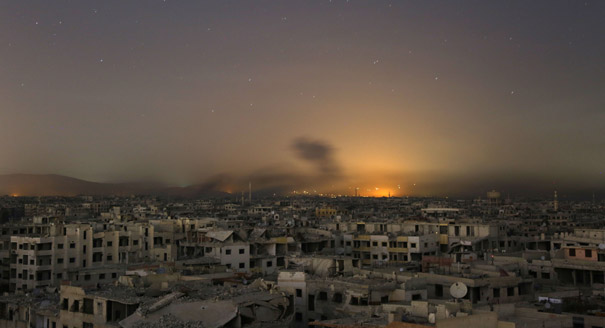It is April 24, 2007, and the United Nations secretary general, Ban Ki-moon, is in Damascus to meet with Syrian President Bashar al-Assad. The main item of discussion, according to a leaked account of the meeting in the French daily Le Monde, is Lebanon, in particular the special tribunal for Lebanon that may be set up under Chapter VII of the UN Charter to put the assassins of former Lebanese prime minister Rafik Hariri on trial. Syria is the main suspect in that crime, and Assad issues a warning to Ban.
Lebanon’s sectarian stability is fragile, Syria’s president tells the secretary general, implying that anything that targets the Syrian regime will have repercussions there. Assad goes on to say that if the tribunal is established, particularly under Chapter VII authority, it “might easily cause a conflict that would degenerate into a civil war, provoking divisions between Sunnis and Shi‘a from the Mediterranean to the Caspian Sea.” His sudden mention of the Shi‘a suggests he knows of Hezbollah’s role in Hariri’s assassination.
But there was another, unspoken, message in Assad’s words. He was underlining that he had no red lines when it came to remaining in power. And this week, on the seventh anniversary of the start of the Syrian uprising, we know not only how far he has been willing to go in that regard, but also how useless international institutions have been in preventing this.
The conflict in Syria has represented a fundamental moment for the international order. Assad’s threats relayed to Ban were not hyperbole. Located at the center of the Arab world, Syria has often been a country where events could have a wider regional impact. The Assads, both Hafez and Bashar, integrated into their methods of power and regime survival the destabilization of neighboring countries. By lighting fires all around, they forced others to come to Damascus to negotiate resolutions. This was true during the 1990s, when Syria encouraged Hezbollah attacks against Israeli occupation forces in southern Lebanon to strengthen their own hand in talks with Israel. It was equally true when the regime allowed the future Islamic State group to gain ground in Syria, so that foreign countries would discuss anti-terrorism matters with Syrian officials.
In order to save his regime after 2011, Assad placed no restraints on the monstrosities his men would commit. They have employed chemical weapons countless times; they have created a humanitarian crisis of biblical proportions, with 5.5 million Syrians forced out of their country and another 6.1 million internally displaced, from a population of 17–18 million; they have destroyed large portions of major towns and cities, bombarding civilians, hospitals, schools, and water supplies; and they have engaged in mass murder, with thousands of people killed in the regime’s prisons.
Yet none of this has led to concerted international action to put an end to the violence or punish the culpable. If anything, Western democratic countries, the pillars of a rules-based international order, have been craven in their reaction to the slaughter—when not complicit, by omission, in allowing it to continue. Indeed, the international community appears to have turned against the victims. Europe risked breakup in 2015 because of the possibility that Syrian refugees might be accepted into its societies, while the United States closed its doors to Syrians this past year. Syria has not just been a black mark on the international system, it has confirmed that those countries expected to defend liberal internationalism are empty vessels.
At the same time, Assad’s strongest backers have paid no price at all for participating in the savage repression of the Syrian people. Iran continues to expand its power in the region, while European countries are eager to pursue lucrative economic opportunities with the Islamic Republic. The United States is mostly incoherent, under the leadership of a television impresario whose Middle Eastern policy amounts to vacant, contradictory headlines. The Putins and Assads of this world have taken the measure of the West, and they are understandably contemptuous. As they widen the margins of what they can do in Syria, they know that pushback will be minimal.
In other words Syria is much more than about Syria. It effectively lays to rest that brief interregnum at the end of the 20th century when humanitarian intervention was all the rage. The massacre at Srebrenica, in Bosnia, was supposed to be a “never again” moment in international relations, but in Syria it seems that every month brings new Srebrenicas, while the siege of Sarajevo pales in comparison to those of Aleppo or the East Ghouta. As illiberalism expands globally, human rights have receded, with Western societies having contributed to this decline. Intolerance is the flavor of the moment and cheap demagogues and arsonists are gaining ground. Syria may not be the sole cause of all this, but it has certainly been a major factor in the West’s abandonment of its values, and of a part of itself.
Assad’s encounter with Ban was highly symbolic. The leading representative of international cooperation heard threats from a third-world despot about which he could do little, other than leak the details of what had been said. Four years later, Assad would, in a different context, be true to his word about Syria’s ability to destabilize the region from the Mediterranean to the Caspian, or thereabouts. Syria’s war may go on for some time, but liberal internationalism can be counted among its most prominent victims.
Pity the Syrian people for imagining that history was on their side. After all, that’s what they heard from charlatans in the West whose bracing words were aimed at making their own indifference more palatable to a population under the knife. On this anniversary of Syria’s uprising, only the lies remain.






